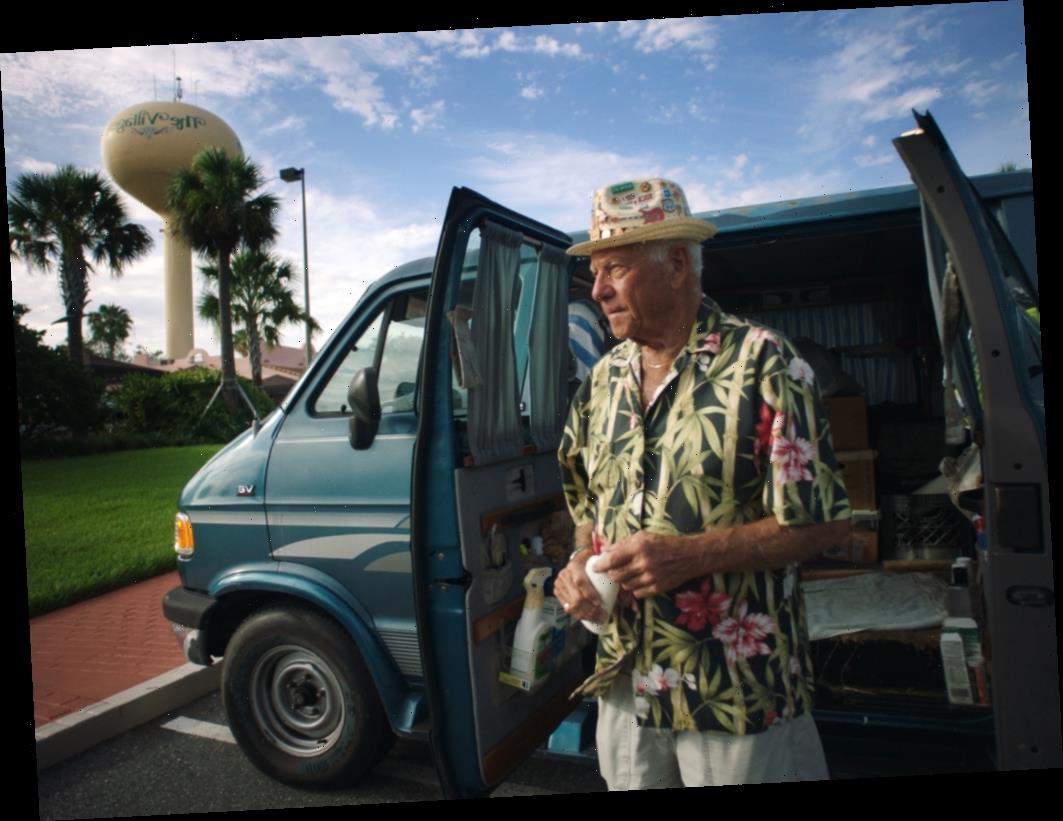The Sundance Film Festival has launched the careers of some extraordinary directors—among them, Steven Soderbergh in 1989 with Sex, Lies and Videotape, Quentin Tarantino in 1992 with Reservoir Dogs, and Darren Aronofsky in 1998 with Pi.
Aronofsky returned to Sundance this year as producer of Some Kind of Heaven, a documentary that heralds the arrival of another exceptional young directing talent, Lance Oppenheim.
“He’s…[five months] out of undergraduate [school] and he’s sitting at Sundance,” remarked Aronofsky, joining the Gen Z director outside the DoubleTree Hotel in Park City. “It took me nine years to get to Sundance and I think it just bodes well about a lot of exciting things we’re going to see from Lance in the future…There’s really a tremendous potential with him.”
Some Kind of Heaven, a production of Aronofsky’s Protozoa Pictures and The New York Times, premiered at Sundance on Sunday, Oppenheim’s 24th birthday. Oppenheim grew up in South Florida but for his film he ventured north of Orlando to explore life in The Villages, the country’s largest retirement community, a golden years utopia sometimes referred to as “Disney World for old people”.
The Villages describes itself as “an amazing, vibrant…golf cart community” and “Florida’s Friendliest Retirement Hometown.” The development’s website gushes, “Homes on tree lined streets. Golf carts cruising by. Neighbors mingling in the town squares. Balmy nights at a concert. Sound too good to be true?…well it really is true!”
Oppenheim peered beneath the almost maniacally cheerful exterior to focus on a few characters who didn’t quite fit into the community’s “smile ’til it hurts” mold.
“The thing I was trying to find were the people who were deviating from the norm,” the director explains, “people who are sticking out.”
People like Ann and Reggie Kincer. Ann fits in fine, enjoying pickleball—a tennis-like game—with fellow residents, but Reggie’s a bit of a square peg, preferring tai chi, mediation and an occasional hit of marijuana.
“They’ve been workaholics to keep from thinking about their problems in life,” Reggie notes of Villagers. “Everybody knows they’re on the brink of death. They’re just ignoring it.”
Barbara Lochiatto, whose large, sad eyes speak volumes, doesn’t necessarily buy into the community’s relentless positivity either.
“I think that when you live in The Villages you’re acting the part every day, every night,” she observes in Some Kind of Heaven. “You’re part of the fantasy.”
The other major character in the documentary is Dennis Dean, a bit of a dodgy octogenarian on the lam from a DUI conviction in California. He lives out of a van that he parks illegally at The Villages, and makes no bones about seeking a wealthy companion—she must be attractive too—who can set him up in a more comfortable lifestyle. The film is entertaining and laugh-out loud funny, yet it’s not meant to ridicule The Villages or the characters.
“I was surprised at how relatable I found many Villagers’ pursuits. Their attempts to find connection, love and meaning were not so dissimilar from my own,” Oppenheim notes in a director’s statement. “In the popular imagination, the elderly transcend their youthful passions to lead placid lives, informed by hard-won wisdom. That may be true for some people, but that stereotype ignores the reality for most older people (especially those in this film!)—who are no less crazy, or complicated, or full of desire than anyone else.”
As Aronofsky puts it, the film is “very open and honest with the human struggle, and how that struggle just continues for the rest of our lives…I think it’s hopeful. I find it hopeful. I guess you could read it both ways, but I definitely feel fulfilled at the end of the film. I think that’s how most people walk away.”
Oppenheim and Aronofsky evince an easy rapport, despite one being an industry newcomer and the other an esteemed master. It’s more like a big brother-little brother vibe. They show obvious respect for each other, but get into a friendly dispute when the subject turns to whether Oppenheim will eventually make fiction as well as nonfiction films.
“Yes, definitely fiction. I’m genre agnostic, whatever it is,” Oppenheim insists, before turning to Aronofsky to add, “I don’t know, it’s like you were a hustler growing up. And I feel like that’s how you—“
“Never. I wasn’t a hustler,” Aronofsky objects. “I was a survivor.”
“Survivor. The way he made Pi, for example, right?” Oppenheim rejoins. “Like the way—“
“That’s not hustling. I was begging, and everyone who invested in that movie made money,” Aronofsky insists. “So not hustling.”
The back and forth continues for a while. But on one subject they’re very much in synch—what should happen next for Some Kind of Heaven.
“We need a big sale,” Aronofsky says. “So put this out there and tell everyone we need a big sale.”
Aronofsky concludes with some parting thoughts on Oppenheim’s bright future.
“I think no matter what happens [after the premiere] Lance’s life has changed. No one’s going to deny the work. I’m sure of that,” he comments. “I mean, it’s a really nice film. It’s very beautiful, it’s very sweet…I can remember in 1998 when I came here with Pi, that screening that changed everything. But there was a “before” [for me], the problem is he hasn’t really had a before. So the danger is that it’s all going to be too much candy for Lance at a young age. So we’re going to have to keep him honest.”
Source: Read Full Article
